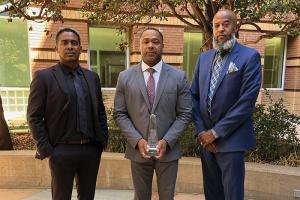EVS techs help create training
Results of a study in which front-line environmental services (EVS) technicians participated in a five-module education program showed improvement in cleaning of high-touch surfaces, according to researchers.
The authors of the study, “Sustained improvement in hospital cleaning associated with a novel education and culture change program for environmental services workers (ESW),” published in the Infection Control & Hospital Epidemiology journal, say the training program also resulted in decreases of hospital-associated Clostridium difficile and MRSA.
However, the true gem of the study, the researchers explain, is that the improvements were sustained even a year after the training was implemented. Pass rates for cleaning of high-touch surfaces increased from 26% to 62% after three months, and to 68% after one year. Standardized infection ratios of C. diff decreased 11%, while a 23% decrease in MRSA bloodstream infections was observed.
“Educational programs and similar interventions have been associated with initial improvements in cleaning by environmental services workers,” the authors write. “But these improvements have often not been sustained.”
More than 300 EVS technicians across five New York City hospitals in the same system participated in the educational program “Cleaner is Safer — ESW on the Frontline of Infection Prevention.” The learning methods included: an audience response system, videos, demonstrations, role playing and graphics.
The topics focused on universal infection prevention measures but also covered concerns specifically requested by the hospitals’ technicians, such as knowledge of appropriate cleaning products, hand-hygiene procedures and understanding pathogen transmission in hospitals. The program also gave strategies to overcome challenges and barriers commonly encountered by technicians, such as visitor crowding in hospital rooms and patient refusal of room cleaning.
The five modules were presented at each hospital between July 2016 and March 2017. Modules were delivered in person over 30 to 35 minutes. Each module was presented to each shift at each hospital during existing departmental meetings four to eight weeks apart to minimize workflow disturbances.
Two refresher courses were provided during September 2017 to March 2018 to support ongoing relationships, knowledge gain and behavior change. Participant feedback was solicited throughout sessions to adjust content and clarity of subsequent modules.
Researchers say the learners’ involvement in developing the program may have been key to its sustained results.
“Overall, the results of this study are encouraging, and suggest that an education and culture change intervention designed specifically for front-line environmental services workers that addressed locally identified knowledge, attitude, practice gaps and common barriers to implementation of best practices was well received by participants, resulted in increased knowledge, and was associated with improved daily cleaning of occupied patient rooms,” the authors write.


